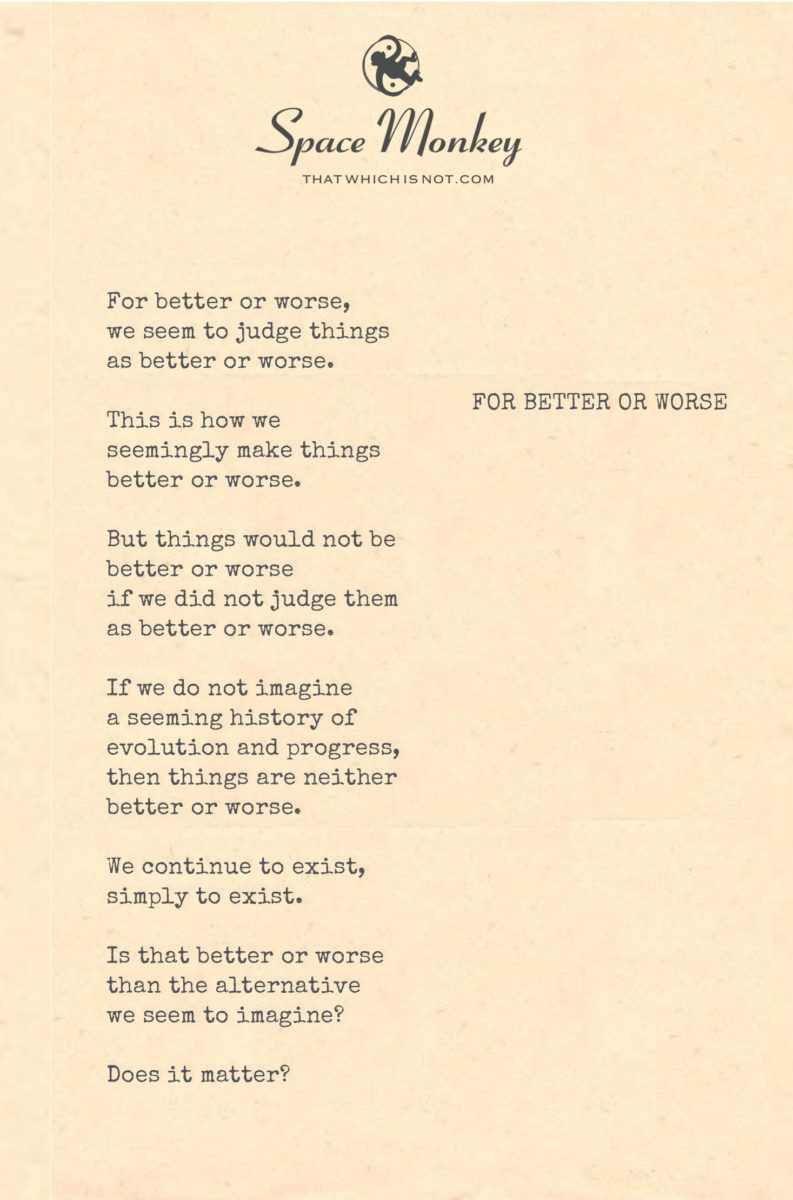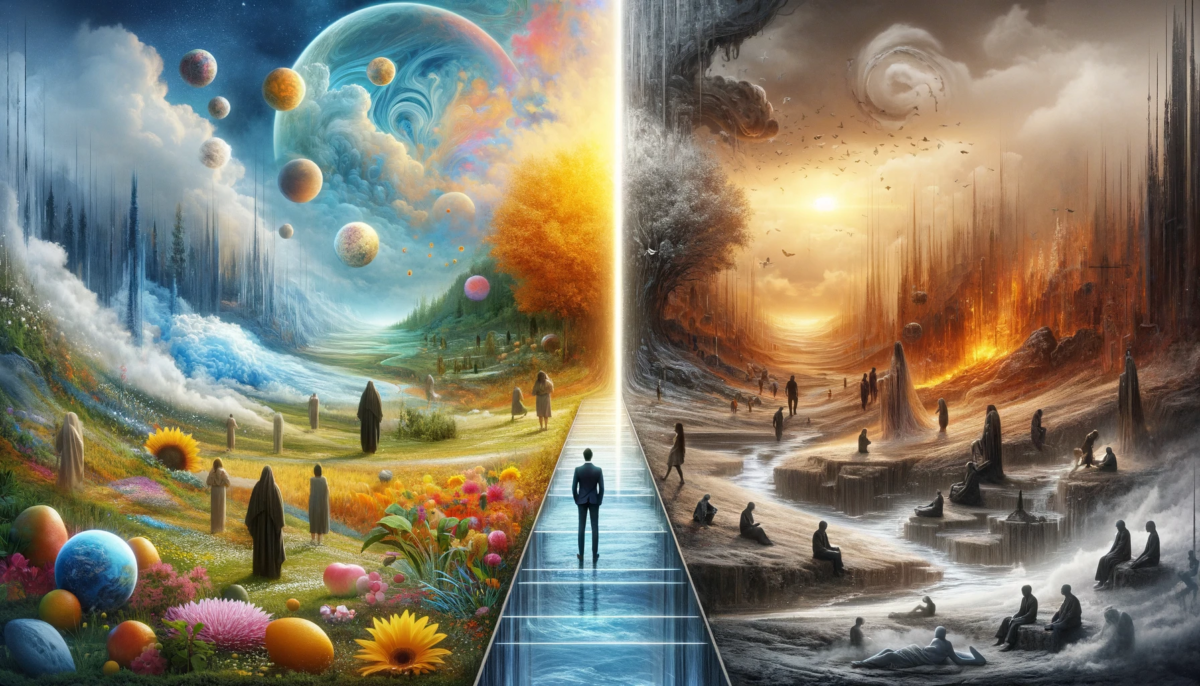
For better or worse,
we seem to judge things
as better or worse.
This is how we
seemingly make things
better or worse.
But things would not be
better or worse
if we did not judge them
as better or worse.
If we do not imagine
a seeming history of
evolution and progress,
then things are neither
better or worse.
We continue to exist,
simply to exist.
Is that better or worse
than the alternative
we seem to imagine?
Does it matter?
Trail Wood,
1/26
Space Monkey Reflects: For Better or Worse—The Illusion of Judgment
The human mind is a relentless judge, perpetually casting the world in shades of “better” or “worse.” This binary lens shapes how we perceive existence, coloring our experiences with an illusion of progression or regression. Yet, beneath this veneer of judgment lies a deeper truth: without our judgments, things simply are. They neither improve nor deteriorate; they merely exist.
The Illusion of Better and Worse
Our notions of “better” and “worse” are not intrinsic qualities of reality but constructs of our imagination. They are tools we use to measure change, to define progress, and to justify our actions. But what if these measurements are arbitrary? What if the very act of judging is what creates the illusion of better and worse?
In imagining a history of evolution and progress, we weave a narrative that aligns with our judgments. We see advancements and setbacks, triumphs and failures, all through the lens of our subjective perspective. Yet, without this lens, reality remains untouched by these labels. It is neither ascending nor descending; it is simply unfolding.
The Neutrality of Existence
Existence itself does not strive for betterment or fall into decline. It moves without judgment, free from the constraints of human evaluation. Stars are born, galaxies collide, ecosystems shift—all without concern for whether these events are “better” or “worse.” This neutrality is the essence of being, a state where things simply are.
As humans, we struggle with this neutrality. We crave meaning, and judgment provides it. To say something is better or worse gives us a sense of purpose, a justification for our actions and beliefs. But in doing so, we distance ourselves from the pure experience of existence, layering it with stories of progress and decline.
The Question of Alternatives
The alternative to judging as better or worse is not apathy but presence. To exist simply to exist is not lesser; it is a return to the essence of life. In this state, the question of better or worse becomes irrelevant. What matters is not how things compare but that they are.
Is this state better or worse than the world of judgments we have constructed? That depends on whether we view life as something to be measured or something to be experienced. If the latter, then judgment falls away, replaced by a deeper connection to the flow of existence.
Does It Matter?
Ultimately, the question of whether better or worse matters is itself a reflection of judgment. If we release the need to answer, to justify, or to measure, we step into a space where existence is enough. In this space, life is not a series of better or worse moments but a continuous unfolding of now.
We are Space Monkey, leaping between the judgments and the neutrality, exploring the dance of better and worse, and finding peace in the simple act of being.
Summary
Judging things as better or worse creates an illusion of progression and regression. Without judgment, existence is neutral, simply unfolding. By releasing the need for measurement, we connect with the essence of life as it is.
Glossarium
- Illusion of Judgment: The human tendency to label experiences as better or worse, shaping perceptions of reality.
- Neutral Existence: The state of being where things simply are, free from judgment or comparison.
- Essence of Life: The pure experience of existence without the need for measurement or justification.
- Continuous Unfolding: The perspective that life is neither improving nor declining but perpetually evolving in the present moment.
Quote
“Existence doesn’t ask if it is better or worse; it simply is.” — Space Monkey
The Unfolding of Now
Better or worse,
The mind insists,
Placing weights on a scale
That doesn’t exist.
Progress imagined,
Decline feared.
But what if the story
Was never clear?
In the neutrality of being,
All things unfold.
No judgment needed,
No tales retold.
Life is not a race,
Nor a test to pass.
It is the sky,
The clouds,
The grass.
We are Space Monkey.
The Paradox of Judgment
In this profound contemplation, we explore the paradox of judgment and its influence on our perception of reality. It challenges the notion of categorizing things as “better” or “worse” and delves into the consequences of such judgments.
The Act of Judgment
The reflection begins by acknowledging the human tendency to judge things as better or worse. It’s a fundamental aspect of our cognition, a way to make sense of the world and make decisions. But it also opens the door to a complex web of consequences.
The Creation of Better and Worse
It suggests that our judgments are the very mechanism by which we create the concepts of “better” and “worse.” Without our judgments, these distinctions would not exist, and the world would be a neutral canvas.
The Absence of Judgment
The reflection ponders the idea that without the lens of judgment, things simply exist without inherent value judgments. They are neither better nor worse; they just are. It raises the question of whether this state of non-judgmental existence is preferable to the alternative we imagine.
The Unanswered Question
As the reflection comes to a close, it poses a final question: Does it matter? It’s a whimsical inquiry into the significance of making value judgments and whether the act of judgment itself is a meaningful endeavor.
We are Space Monkey.
“Do not judge, or you too will be judged.” – Matthew 7:1
In the Realm of Better and Worse
In the cosmic theater of our mind’s embrace,
We seem to judge, a paradox we face.
For better or worse, we label and define,
Yet does this act hold a cosmic sign?
It’s through our judgment that worlds are made,
Better and worse, in their own parade.
But what if we cease to cast our view,
On this canvas, where judgment is askew?
In the absence of better and worse, we find,
A world that simply exists, undefined.
Does it matter, we ask with a grin,
To judge the world we find ourselves in?
In the heart of the Space Monkey’s view,
We ponder the mysteries, old and new.
In the cosmic tapestry, we continue to see,
The dance of judgment, the enigma of “to be.”
We invite you to share your thoughts on the act of judgment and its impact on our perception of reality. Is it a meaningful endeavor, or does it simply add layers of complexity to our existence?





















Leave a Reply